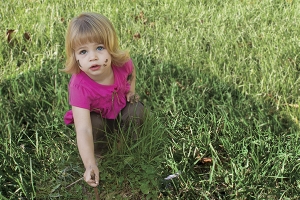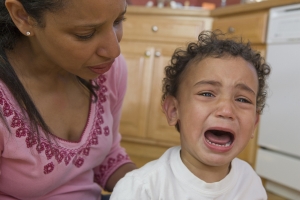To most parents “Toddlers & Tiaras” is so offensive that we can hardly watch it, let alone relate to it. After all, this is a show depicting the horrifying phenomenon of children’s beauty pageants. Crazed, crown-obsessed parents dressing up their children like “living dolls” complete with hairpieces, false eyelashes, heavy makeup, spray tanner and hyper-sexualized outfits seem, to most people, like cult members from another planet. In fact, there is much we can learn from “Toddlers & Tiaras” about how to help our girls build high self-esteem.
Under the guise of glitz, fun and even confidence-building, pageant-parents are setting their daughters up for a lifetime of insecurity and low-fat love— pursuits and relationships that will not fill them.
Children’s beauty pageants promote unhealthy competition between girls, the cultivation of negative personality traits (such as acting like a “diva”) and an over-emphasis on appearance and physicality. While this may be obvious to many, what we often fail to see are the grains of these behaviors “normal” parents may engage in.
Here are the top five lessons all parents can take from these pageant-parent-monsters in order to help their daughters build authentic and long-lasting self-esteem.
1. Praise intellectual, creative and athletic accomplishments. First, these accomplishments take hard work and commitment, qualities we want to cultivate in our children. Second, these activities bring endless rewards to our daughters, throughout the life course. By encouraging these pursuits we are setting up our daughters to build fulfilling lives not based on superficial qualities. It is easy to fall into the trap of praising our girls for being pretty or cute, or for wearing a trendy outfit. However, as parents it is important to show our daughters the kinds of accomplishments we really value.
2. Praise displays of kind and egalitarian behaviors. Sometimes parents talk about their daughters, especially during the mean tween years, as people who, if they were roommates, would have their lease terminated. In order to raise the kind of young women we would want to befriend, let alone live with, we need show them that we value congenial behaviors. Grace is about equality, not hierarchy.
3. Provide incentives that are based on factors they can control. Instead of bartering with our daughters—“I’ll clean your room if you win the crown”—offer incentives to good behaviors and accomplishments that they can control. For example, instead of offering a reward for earning a particular grade, offer the reward based on how much time they spend studying. Offering incentives for things dependent on the judgment of others sets your daughter up for a lifetime of seeking external validation. Instead, teach her how to develop her own sense of self-worth not beholden to the judgment of others.
4. Promote positive relationships with other girls. Girls need girlfriends. Healthy relationships with peers can greatly strengthen the quality of our daughter’s life. Girlfriends can offer support, a springboard for self-reflection and companionship. Destructive patterns of communication—such as gossiping, teasing, jealousy and comparison—can be discouraged as we encourage our girls to value and attend to the quality of their friendships.
5. Treat your kids with compassion without projecting your insecurities onto them. More than anything else, I feel badly for the pageant-parents on “Toddlers & Tiaras” because it is so obvious they are trying to live vicariously through their children. Perhaps they were picked on as children, or perhaps their childhood was their happiest time and their adult lives are lacking. In any event, they certainly don’t present themselves as people to emulate. I can’t help but wonder if they are just putting their own insecurities onto their daughters in the hopes of immediate—and glittery—validation. If so, no doubt it is unintentional. They likely even think they are helping their daughters to build confidence and have fun. The audience knows better.
--------------------
Patricia Leavy, PhD is an acclaimed pop-feminist author and expert commentator as well as a leading qualitative and arts-based researcher with a dozen books to her credit. She is the author of the new book, Low-Fat Love.










